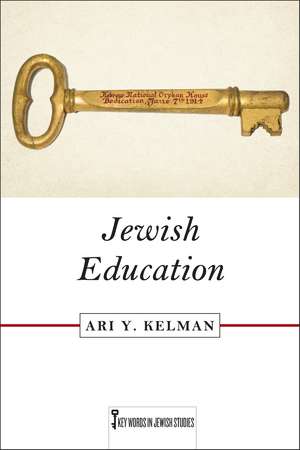Jewish Education: Key Words in Jewish Studies
Autor Ari Y Kelmanen Limba Engleză Paperback – 17 mai 2024
At the heart of Jewish Education is an innovative alphabetical primer of Jewish educational values, qualities, frameworks, catalysts, and technologies which explore the historical ways in which Jewish communities have produced and transmitted knowledge. The book examines the tension between Jewish education and Jewish Studies to argue that shifting the locus of inquiry from “what people ought to know” to “how do people learn” can provide an understanding of Jewish education that both draws on historical precedent and points to the future of Jewish knowledge.
Din seria Key Words in Jewish Studies
-
 Preț: 153.22 lei
Preț: 153.22 lei -
 Preț: 304.43 lei
Preț: 304.43 lei -
 Preț: 401.02 lei
Preț: 401.02 lei -
 Preț: 286.52 lei
Preț: 286.52 lei -
 Preț: 313.73 lei
Preț: 313.73 lei -
 Preț: 286.09 lei
Preț: 286.09 lei -
 Preț: 284.95 lei
Preț: 284.95 lei -
 Preț: 286.52 lei
Preț: 286.52 lei -
 Preț: 322.55 lei
Preț: 322.55 lei - 22%
 Preț: 214.90 lei
Preț: 214.90 lei
Preț: 240.65 lei
Nou
Puncte Express: 361
Preț estimativ în valută:
46.05€ • 48.02$ • 38.27£
46.05€ • 48.02$ • 38.27£
Carte indisponibilă temporar
Doresc să fiu notificat când acest titlu va fi disponibil:
Se trimite...
Preluare comenzi: 021 569.72.76
Specificații
ISBN-13: 9781978835627
ISBN-10: 1978835620
Pagini: 208
Ilustrații: 0 illustrations
Dimensiuni: 152 x 229 x 20 mm
Greutate: 0.05 kg
Editura: Rutgers University Press
Colecția Rutgers University Press
Seria Key Words in Jewish Studies
ISBN-10: 1978835620
Pagini: 208
Ilustrații: 0 illustrations
Dimensiuni: 152 x 229 x 20 mm
Greutate: 0.05 kg
Editura: Rutgers University Press
Colecția Rutgers University Press
Seria Key Words in Jewish Studies
Notă biografică
ARI Y. KELMAN is the Jim Joseph Professor of Education and Jewish Studies in the Stanford Graduate School of Education in Stanford, California. He is the author of Station Identification: A Cultural History of Yiddish Radio in the United States and coeditor of Beyond Jewish Identity: Rethinking Concepts and Imagining Alternatives.
Cuprins
Foreword
Introduction: The Toughest Kid in Hebrew School
Part I Terms of the Debate
Estranged Siblings
Part II State of the Question
Logics of Production: Values, Qualities, Frameworks
Modes of Transmission: Catalysts and Technologies
Part III In a New Key
Learning in Jewish Education
Conclusion: Education Everywhere
Acknowledgments
Notes
Index
Introduction: The Toughest Kid in Hebrew School
Part I Terms of the Debate
Estranged Siblings
Part II State of the Question
Logics of Production: Values, Qualities, Frameworks
Modes of Transmission: Catalysts and Technologies
Part III In a New Key
Learning in Jewish Education
Conclusion: Education Everywhere
Acknowledgments
Notes
Index
Recenzii
"Kelman takes readers on a fascinating journey, from the traditional Beit Midrash to the frontiers of the internet, that reveals how people have learned about and engaged with Jewish life across time and place. In accessible prose that is at once playful and serious, this book invites readers to consider both the deep roots and the transformative possibilities of Jewish learning."
"This is a must-read book for anyone seeking to develop a more informed and carefully theorized understanding of Jewish education, its past, present and future. As a cutting-edge researcher in the field of Jewish education, Kelman has so much to teach those of us who care about what Jews are learning today and how they are learning it."
"Ari Kelman teaches us that Jewish education is as broad and diverse as all of Jewish culture and life. When seen through his eyes, Jewish education is not simply a project that some Jews undertake, for some years of their life, in some specific locations like schools or synagogues or camps. Instead, Jewish education happens everywhere that Jews enact Jewish culture and bring other Jews into that culture."
"The literature on Jewish education has largely centered on the teacher, and the educator’s goals and practice over the ages. By examining how students confront and absorb the Jewish content to which they are introduced, Kelman adds an important dimension to our understanding of the field."
"This is a must-read book for anyone seeking to develop a more informed and carefully theorized understanding of Jewish education, its past, present and future. As a cutting-edge researcher in the field of Jewish education, Kelman has so much to teach those of us who care about what Jews are learning today and how they are learning it."
"Ari Kelman teaches us that Jewish education is as broad and diverse as all of Jewish culture and life. When seen through his eyes, Jewish education is not simply a project that some Jews undertake, for some years of their life, in some specific locations like schools or synagogues or camps. Instead, Jewish education happens everywhere that Jews enact Jewish culture and bring other Jews into that culture."
"The literature on Jewish education has largely centered on the teacher, and the educator’s goals and practice over the ages. By examining how students confront and absorb the Jewish content to which they are introduced, Kelman adds an important dimension to our understanding of the field."
Descriere
Jewish education has been dominated by two concerns: What ought to be taught? And what is the best way to teach it? This book upends the conventional approaches by asking a different question: How do people learn to engage in Jewish life?
